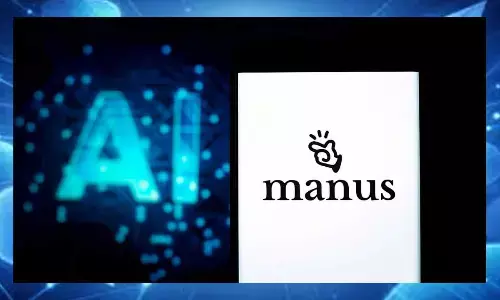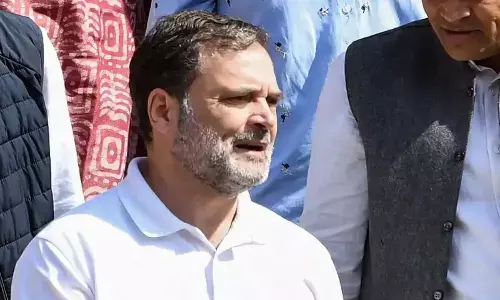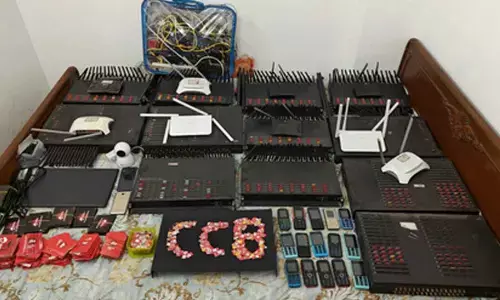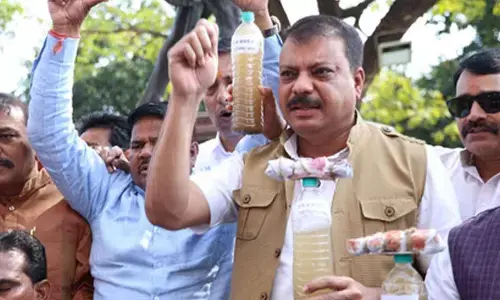K'taka CM's case: 'Decision followed due process', SG defends Governor in HC
Share :
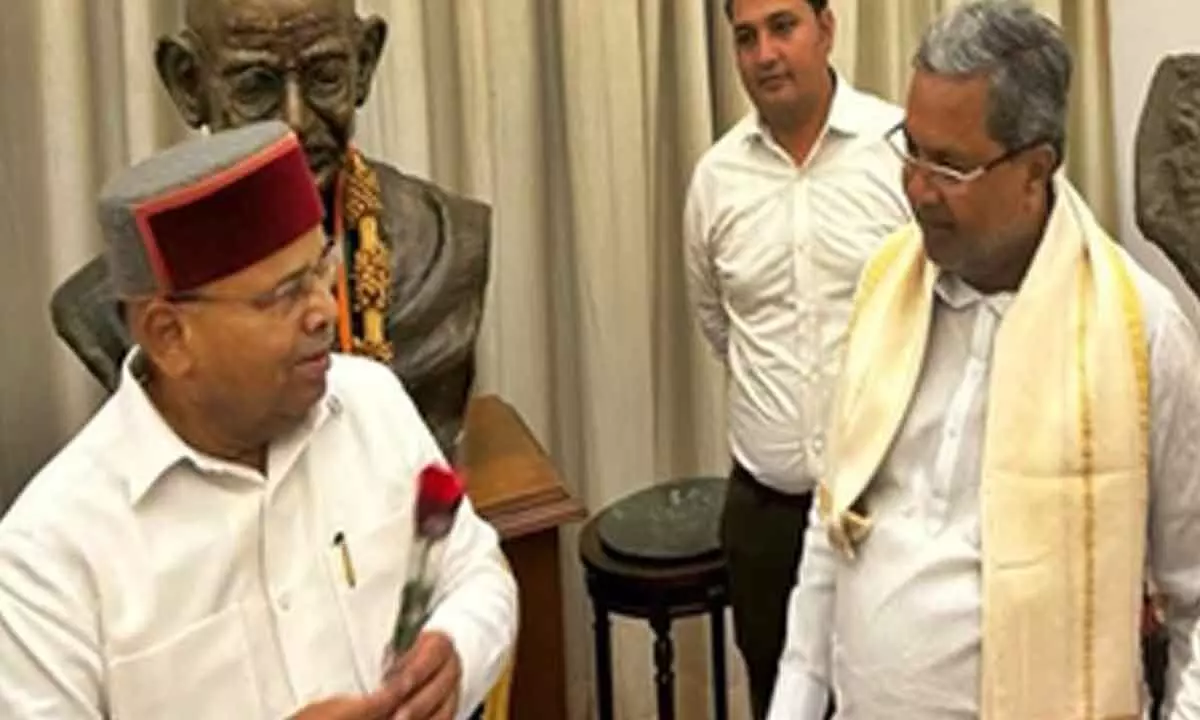
The Karnataka High Court on Saturday resumed hearing the writ petition filed by Chief Minister Siddaramaiah against Governor Thawar Chand Gehlot’s decision to give consent for his prosecution in the alleged irregularities in the Mysuru Urban Development Authority (MUDA).
Bengaluru: The Karnataka High Court on Saturday resumed hearing the writ petition filed by Chief Minister Siddaramaiah against Governor Thawar Chand Gehlot’s decision to give consent for his prosecution in the alleged irregularities in the Mysuru Urban Development Authority (MUDA).
The Bench, headed by Justice M Nagaprasanna, is hearing the matter. Solicitor General (SG) Tushar Mehta concluded submissions on Saturday on behalf of the Governor.
Senior Counsel Abhishek Manu Singhvi, appearing for CM Siddaramaiah, had already presented his arguments, seeking to quash the Governor’s order.
Defending the Governor, Solicitor General Tushar Mehta submitted that the decision was made lawfully and followed due process.
Mehta submitted that there is no necessity to even look at the cabinet advice to the Governor. The minister selected by the Chief Minister will have loyalty towards him. When there is an allegation against the CM, their advice will not be considered. In spite of this, the Governor had considered the report by the cabinet.
“The Chief Minister might not have attended the cabinet meeting in which the decision was taken to advise the Governor. However, the person, named by the CM, conducted the meeting. The Chief Minister has nominated Dy CM D.K. Shivakumar under Rule 28 to conduct the meeting in his place. It is mentioned in the cover letter. The decision of the cabinet, which can’t go against the CM, cannot be considered,” Mehta submitted.
He further noted that the Supreme Court judgments referred by CM Siddaramaiah’s counsel Abhishek Manu Singhvi are in favour of the Governor. These judgments have recognised the discretionary powers of the Governor.
The Governor took cognisance of a 91-page Cabinet decision to withdraw the show-cause notice to CM Siddaramaiah and reject the petition against him.
Mehta emphasised that since Cabinet ministers are selected by the Chief Minister himself, it is not imperative for the Governor to consider the Cabinet’s decision when a complaint is against the CM.
He added that it is unlikely for the Cabinet to take a decision against the CM.
Mehta further submitted that the relief package ratio was changed from 40:60 to 50:50 and that CM Siddaramaiah’s son, former MLA Yathindra Siddaramaiah, had attended the General Body Meeting of MUDA in this regard. Alternative sites were allotted in a reputed locality.
Despite all this, the state Cabinet took a biased decision in support of CM Siddaramaiah, he argued.
In this context, the Governor made an independent decision in the matter using his discretion.
The Governor took into account the Cabinet's advice, CM Siddaramaiah’s clarification, and the petitioner’s complaint.
Referring to a Supreme Court judgment, Tushar Mehta submitted that those in power often believe they will not face punishment.
The Bench observed that under Section 17(A) of the Prevention of Corruption Act, the police are not supposed to take up an investigation without prior permission.
However, it is not necessary for the police to obtain permission themselves; anyone can approach the appropriate authorities to obtain such permission.
Tushar Mehta further submitted that no investigation is required to grant permission for prosecution for administrative matters.
Under Section 17(A) of the Prevention of Corruption Act, it is decided whether an investigation is required or not needed.
He argued that the Governor is not obliged to respond to every clarification provided by the Cabinet and CM Siddaramaiah in this case.
The Governor's order clearly states his position, and not everything can be explained at this stage due to the potential for destruction of evidence.
Mehta also pointed out that the charges in all three complaints against CM Siddaramaiah were the same, and there was no need to issue a show-cause notice in connection with the other two complaints.
Senior counsel Manindar Singh making submissions for one of the petitioners Snehamayi Krishna, pleaded with the court to note the three figures “Rs 3.24 lakh”, “Rs 5.98 lakh” and “Rs 55 crore”. When the land was acquired, the price of the disputed land was Rs 3.24 lakh. It was sold for Rs 5.98 lakh and now the value of the land is claimed to be Rs 55 crore. In this background, there is a need for an investigation into the case by an independent agency.
There is Rs 55 crore profit out of de-notification in the case. The common man will have to run pillar to post to get de-notification done. The de-notification is not possible even if there is a school in the acquired land. Even as the land is developed by the MUDA, it is denotified. Once the land is acquired, it can’t be taken back. The land owner is only eligible to get 9 per cent of interest, Manindar Singh submitted quoting the Indore Development case.
The whole government is standing before the Chief Minister. How can the land in the name of MUDA get denotified? This is a planned illegality, he maintained.
Singh further stated that proceedings are different for acquired land and the land which is not acquired. In 1998, the land was acquired by the MUDA and an order fixing the compensation was also issued later. Between 2001 and 2004, the sites were distributed from the acquired land. No one has gone to court questioning the land acquisition. The decision which is not officially published as a notification by the government is used. The de-notification is done to take away the land, Singh submitted to the court demanding investigation be needed in the case.
On Thursday, the Karnataka High Court adjourned the hearing of the writ petition filed by CM Siddaramaiah challenging Governor Gehlot's decision to give his nod to launch a probe against the veteran Congress leader, to Saturday.
Singhvi argued that the Governor did not follow the principles of natural justice when granting consent for prosecution against CM Siddaramaiah. He also mentioned that the Governor did not consider the advice given by the Cabinet in this matter.
At this point, the Bench had questioned Singhvi whether the Governor is required to take the advice of the Cabinet in matters involving complaints against the CM.
Singhvi responded that the Governor has to take such advice, maintaining that there are limitations to the Governor's powers.
Represented by senior counsel Singhvi, the CM has sought interim relief as well as quashing of the Governor's order, calling it unconstitutional.

